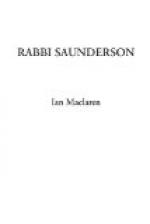One of the boys read an account of this incident—thinly veiled—in a reported address of the evangelist, in which the Rabbi—being, as it was inferred, beaten in Scriptural argument—was very penitent and begged his teacher’s pardon with streaming tears. What really happened was different, and so absolutely conclusive that Doctor Dowbiggin gave it as his opinion “that a valuable lesson had been read to unauthorized teachers of religion.”
Carmichael recognised the same note in the sermon and saw another man than he knew, as the Rabbi, in a low voice, without heat or declamation, with frequent pauses and laboured breathing, as of one toiling up a hill, argued the absolute supremacy of God and the utter helplessness of man. One hand ever pressed the grapes, but with the other the old man wiped the perspiration that rolled in beads down his face. A painful stillness fell on the people as they felt themselves caught in the meshes of this inexorable net and dragged ever nearer to the abyss. Carmichael, who had been leaning forward in his place, tore himself away from the preacher with an effort, and moved where he could see the congregation. Campbell was drinking in every word as one for the first time in his life perfectly satisfied. Menzies was huddled into a heap in the top of his pew a man justly blasted by the anger of the Eternal. Men were white beneath the tan, and it was evident that some of the women would soon fall a-weeping. Children had crept close to their mothers under a vague sense of danger, and a girl in the choir watched the preacher with dilated eyeballs, like an animal fascinated by terror.
“It is as a sword piercing the heart to receive this truth, but it is a truth and must be believed. There are hundreds of thousands in the past who were born and lived and died and were damned for the glory of God. There are hundreds of thousands in this day who have been born and are living and shall die and be damned for the glory of God. There are hundreds of thousands in the future who shall be born and shall live and shall die and shall be damned for the glory of God. All according to the will of God, and none dare say nay nor change the purpose of the Eternal.” For some time the oil in the lamps had been failing—since the Rabbi had been speaking for nigh two hours—and as he came to an end of this passage the light began to flicker and die. First a lamp at the end of Burnbrae’s pew went out, and then another in the front. The preacher made as though he would have spoken, but was silent, and the congregation watched four lamps sink into darkness at intervals of half a minute. There only remained the two pulpit lamps, and in their light the people saw the Rabbi lift his right hand for the first time.
“Shall . . . not . . . the . . . Judge . . . of all the earth . . . do . . . right?” The two lamps went out together and a great sigh rose from the people. At the back of the kirk a child wailed, and somewhere in the front a woman’s voice—it was never proved to be Elspeth Macfadyen—said audibly, “God have mercy upon us.” The Rabbi had sunk back into the seat and buried his face in his hands, and through the window over his head the moonlight was pouring into the church like unto the far-off radiance from the White Throne.




